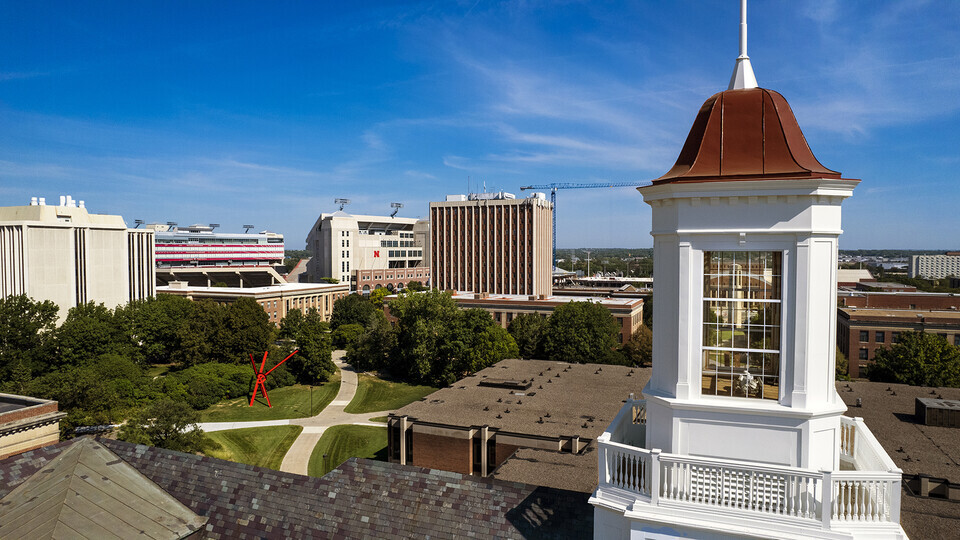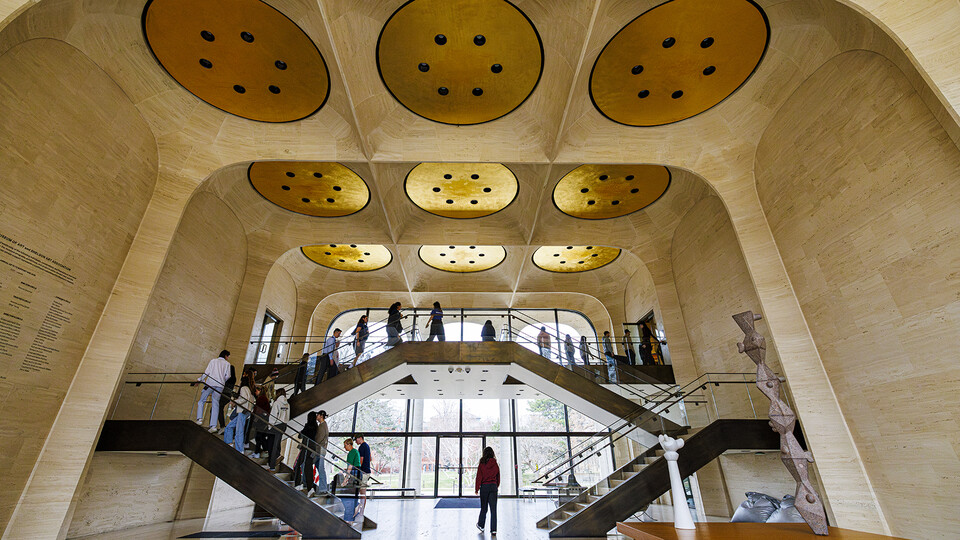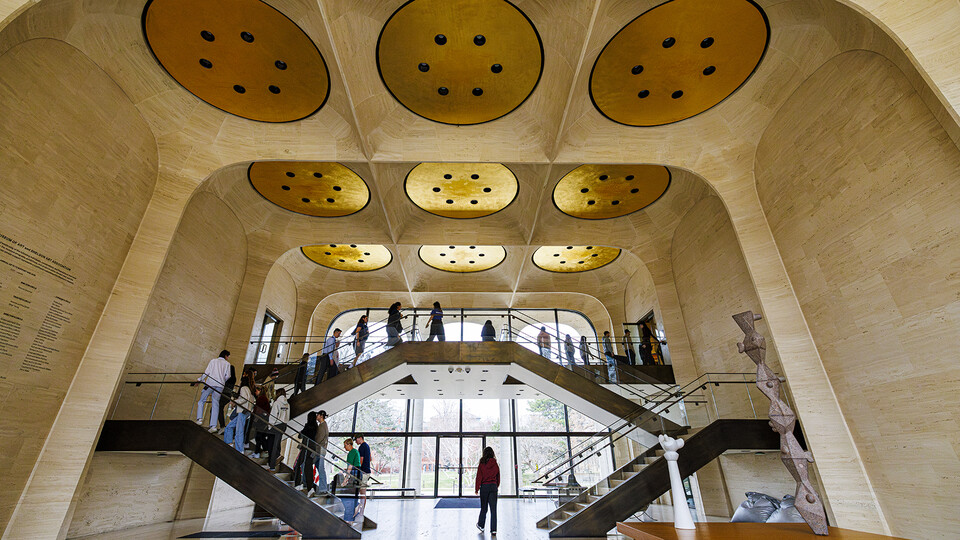
High-impact research projects that will use quantum approaches to address climate resilience and sustainable energy; scale up educational programs for at-risk children in Nebraska and support the early childhood workforce; and make food plastics safer for consumers have been funded through the second Grand Challenges Catalyst Competition.
Chancellor Rodney Bennett and Bob Wilhelm, vice chancellor for research and economic development, announced 11 new Grand Challenges projects Aug. 28. Projects include three catalyst awards and eight planning grants, for an investment of $10 million in the program’s second year.
For more information, read "11 projects funded through Grand Challenges competition" on Nebraska Today.
Catalyst Awards
Catalyst award projects are bold and catalytic, representing significant new research, scholarly and creative activity that have potential to solve grand challenges critical to Nebraska and the world. A two-step external peer review process informed catalyst award project selection.
Quantum Approaches Addressing Global Threats
The world is facing daunting changes in the coming decades — and quantum science and engineering can offer solutions for helping humans adapt. Physicist Christian Binek and mathematician Susan Hermiller will lead a highly interdisciplinary team of 22 faculty that will leverage the rapidly growing field to address major global threats. The team has four focus areas: solutions to address the growing energy needs for communication and information processing; sustainable agriculture; achieving climate resilience; and quantum literacy and workforce development.
The project builds on Nebraska’s internationally recognized discoveries in materials, nanoscience, and emergent quantum materials and technologies. While the basis of the project is using quantum science to model, plan, predict and engineer solutions to solve global problems, the team is incorporating diverse perspectives and unconventional problem-solving strategies to fully understand the challenges and opportunities. Faculty experts from mathematics, physics and astronomy, public relations, mechanical and materials engineering, electrical and computer engineering, computer science, chemistry, emerging media arts and music have been fully integrated into the project, which received a five-year, $4.17 million award from the Grand Challenges initiative.
CAS collaborators:
- Shireen Adenwalla, physics and astronomy
- Kirill Belashchenko, physics and astronomy
- Peter Dowben, physics and astronomy
- Yinsheng Guo, chemistry
- Alexei Gruverman, physics and astronomy
- Xia Hong, physics and astronomy
- Alexey Kovalev, physics and astronomy
- Alexandra Seceleanu, mathematics
- Robert Streubel, physics and astronomy
- Evgeny Tsymbal, physics and astronomy
- Xiaoshan Xu, physics and astronomy
Inspiring Outcomes for Children through Equitable Early Childhood Education Experiences (E4)
Lisa Knoche, co-director of the Nebraska Center for Research on Children, Youth, Families and Schools and research associate professor, is principal investigator. She will lead a large-scale program to deliver proven, evidence-based interventions in early childhood settings using a multi-pronged approach with a team of 19 faculty, plus university, state and community partners. Several Nebraska communities will be involved in this program. A five-year, $3.44 million Grand Challenges initiative award supports the project.
CAS collaborator:
- Jenna Finch, psychology
Release of Micro- and Nanoplastics from Plastic Food Containers — Characterization, Risk Assessment, Socioeconomic and Health Impacts
Yusong Li, associate dean for faculty and inclusion in the College of Engineering and professor of civil and environmental engineering, is principal investigator. Li leads a team that will establish an interdisciplinary center for conducting cutting-edge scientific research on which plastics and use conditions are most likely to release toxic micro- and nanoparticles. In addition to Li, the project involves six Nebraska faculty members, a University of Nebraska Medical Center collaborator and a three-member advisory panel.
CAS collaborator:
- Seulki Kim, sociology
Planning Grant Awards
Planning grants were selected through an internal review process. Review panels were composed of volunteers that included current and emeriti faculty and staff.
Clint Rowe, professor of Earth and atmospheric sciences, “Community Climate Resilience on the Great Plains.”
CAS collaborators:
- Liang Chen, earth and atmospheric sciences
- Ross Dixon, earth and atmospheric sciences
- Julia Frengs, modern languages and literature
- James Garza, history
- Margaret Jacobs, history
- Ursula Kreitmair, political science
- Kevin Lee, physics and astronomy
- LuAnn Wandsnider, School of Global Integrative Studies
Ashley Votruba, assistant professor of psychology, "Equitable Access to Civil Justice: Uniting an Interdisciplinary Team to Develop an Open-Access Knowledge Hub."
Additional CAS collaborators for other Planning Grant awards
"Developing an Interdisciplinary Global Forced Migration and Health Collaborative"
Julie Tippens (PI), child, youth and family studies
- Courtney Hillebrecht, political science
- Emira Ibrahimpašić, School of Global Integrative Studies
- Taylor Livingston, School of Global Integrative Studies
- Julia Reilly, School of Global Integrative Studies
Improving Healthcare Access for Underserved Populations
Michelle Hughes (PI), special education and communication disorders
- Cary Savage, psychology; Center for Brain, Biology and Behavior
Building Community Connections for Improved Climate Resilience and Food Security: A Tribal Non-Tribal Partnership Investigating the Role of Artificial Intelligence in Affecting Behavior Change
Mohammad Hasan (PI), electrical and computer engineering
- Julia McQuillan, sociology
TrustGenViz: An Initiative to Advance Trust and Visualization for Generative Language Models of Biological Sequences
Qiuming Yao (PI), School of Computing
- Etsuko Moriyama, School of Biological Sciences; Center for Plant Science Innovation
- Jack Jeffries, mathematics


